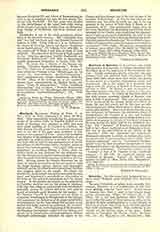

Eberhard, MATTHIAS, Bishop of Trier, b. November 15, 1815, at Trier (Germany), d. there May 30, 1876. After successfully completing the gymnasium course of his native town, he devoted himself to the study of theology, was ordained in 1839, and soon after made assistant at St. Castor’s in Coblenz. In 1842 Bishop Arnoldi made him his private secretary, and, at the end of the same year, professor of dogmatics in the seminary of Trier. From 1849 to 1862 he was director of the seminary and also preacher at the cathedral; in 1850 he became a member of the chapter; from 1852 to 1856 he was representative of his fellow-citizens in the Prussian Lower Chamber, where he joined the Catholic section. On April 7, 1862, he was preconized as auxiliary Bishop of Trier; after Arnoldi’s death he was proposed for the episcopal see, but the Prussian Government acknowledged him only after the death of Arnoldi’s successor, Pelldram, July 16, 1867. Having chosen St. Charles Borromeo for his ideal, he spared no exertion, on the one hand, to make his clergy learned, zealous, devout, and thoroughly cultured, and on the other to cultivate a truly Christian and religious spirit in the people. To attain this double end, he bestowed very great care upon his seminary and demanded a conscientious observation of his rules on the pastoral conferences and the annual retreat. In the parishes he insisted on the instruction in Christian doctrine and on the giving of missions, took care that religious associations were established, especially among the youths and men, and tried to found everywhere good libraries for the people. At the Vatican Council he appeared several times as a speaker; he belonged to the minority of the bishops, who considered the definition of the pope’s infallibility as inopportune for the time being; but as soon as the matter had been decided, he published the constitution at once. When, in the beginning of the seventies, the Prussian Government wished to fetter bishops and priests by its ecclesiastico-political legislation, Bishop Eberhard unflinchingly defended the rights of the Church and thus became one of the first victims of the so-called Kulturkampf. At first he was fined an exorbitant sum, but since he could not pay it, he was retained in the prison of Trier from March 6 to December 31, 1874. New persecutions began after he had been dismissed; the flourishing institutions which belonged to the Church were closed and the appointment of priests was made impossible; the grief at the unhappy condition of his diocese accelerated his death. He is the author of a dissertation “De tituli Sedis Apostoliem ad insigniendam sedem Romanam usu antiquo ac vi singulari” (Trier, 1846). His sermons, masterpieces of oratory, were edited after his death by Ditscheid in 6 vols. (Trier, 1877-1883; Freiburg, 1894-1903).
PATRICIUS SCHLAGER

